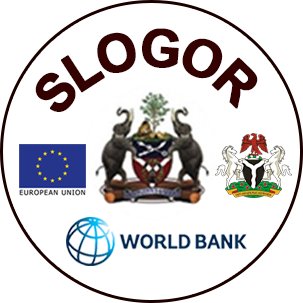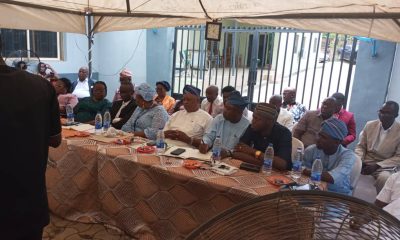Opinion
HOW SLOGOR PROJECT HAS IMPACTED GREATLY ON PFM, LOCAL GOVERNANCE IN NIGERIA

By Ajewole Ebenezer
The State and Local Governance Reform Project (SLOGOR), will be officially closing on the 31st of March 2021. The Project funded by the European Union (EU) and managed by the World Bank came in to effectiveness in 2015.And since then, it has lived up to its development objective; which is to promote transparency, accountability and quality in the Public Financial Management in the six participating states of Anambra, Cross River, Jigawa, Kano, Osun and Yobe. Just in just 6 years of existence of the Project in Nigeria, it has revolutionised PFM and Local governance.
For instance, in PFM, which is the Component A of the Project, prior to the commencement of the SLOGOR Project, many states in Nigeria struggled with the issues that beset PFM – like fiscal prudence, late planning of Budget and late signing in to law in good time; issues of implementation, and Credibility of Budgets. Also these issues includes, Poor Accounting, Recording and Reporting System, financial recklessness etc. In short, Public financial management systems were considered generally weak in Nigeria and are particularly worse at the sub-national levels of government. Though some states tried to institute different forms of reforms in the past to curb these issues, but clearly, the result showed that PFM in Nigeria remained weak.
The SLOGOR Project Appraisal Document (PAD) in its review of the Status public finance management in the participating states, noted that that the weakness in economic, fiscal and public financial management systems at sub- national levels naturally impact negatively on whatever efforts or accomplishments the federal government has made in the these areas.
But today, the story of PFM has tremendously changed in the six participating states of SLOGOR, courtesy of the reforms taking place in these states, supported by the Project. In a bid to strengthen PFM in the six states, the Project supported revenue generation, fiscal planning and standardization of PFM procedures, processes, and reporting among participating state governments for consistency with the federal government. The Project also supported Review of existing financial management legislation and regulations, drafting of new legislation and regulations where necessary, and organization of sensitization seminars on public finance reforms. The other support provided by the Project includes Strengthening budget execution processes and institutions in the public service, particularly as they interface with the SIFMIS; Review and modernization of the accounting and financial reporting, Strengthen the state external audit function, including capacity building for members of the public accounts committees of the states’ legislatures and strengthening of state tax and IGR administration in participating states. The list of activities provided by the Project regarding the reforms carried out on PFM includes; support for the development of social accountability mechanisms in key areas such as planning, budgeting and public procurement, which will involve the public in the oversight of the use of public resources; Review and strengthening of public procurement processes and practices; institutions and engagement with civil society; and Capacity building in PFM, including the conduct of a thorough assessment of existing skills and training needs of Ministries, Department and Agencies (MDAs) responsible for state PFM functions.
The support has seen all six states in the SLOGOR Project submitted their Audited Financial Statements, on their2019 Accounts, to their States’ Assemblies before the end of June 2020. Also, the impact of the reforms has led tofour of the participating states achieving the target of meeting with the deadline of 30 September 2020 for states producing annual financial statements using SIFMIS. With the support of the SLOGOR Project and the efforts of the state governments, their Internally Generated Revenue (IGR) have increased tremendously raised to 180 percent.
Equally, on Percentage of Public contracts above threshold awarded through open competition, Four States (Jigawa – 97 percent, Osun – 85 percent, Yobe 85 percent and Cross River – 85 percent) have met and surpassed the target. The figure of actual result reported is based on the average for the four states that met the target i.e. 88 percent.
The Component B- of the Project, Devolution of functions to Local Government has also received huge support from the SLOGOR Project. The Project has Supported each state to carry out studies on devolution of authority to Local Governments (LGs) , disseminate and validate the outcome of these studies. The Project has provided technical assistance to each state government to develop and implement a road map for devolution of authority by the state government to selected agencies responsible for local governance. Also, the Project has Strengthened in each state the selected LGs, the office of Auditor General for Local Governance and Ministry of Local Governments in areas of accounting, auditing, budgeting, procurement, tax administration and M & E.
Recognising the significance to sustain the gains recorded, the following recommendations were listed for implementation by the project: (i) Project activities should be aligned with State Government Economic Blue Print, (ii) Yearly budgetary provision for SLOGOR activities, and (iii) the current legal and institutional framework should be maintained after project closure.
The SLOGOR Project has not only impacted greatly on PFM and Local Governance by improving transparency, accountability and quality in the participating states; but also the success story recognised and applauded by the states, the Federal Government and the World Bank.
Ajewole Ebenezer is the National Communications Officer, SLOGOR. He writes from Abuja.
-

 News5 days ago
News5 days agoAPC National Chairman: Moves To Oust Ganduje Put Presidency In Quandary
-

 News3 days ago
News3 days agoOsun RAAMP Opens Bid For Road Constructions Statewide
-

 News2 days ago
News2 days agoCapacity Building: OHIS Organizes Retreat For New Board Members
-

 News2 days ago
News2 days agoFamily Of Gruesomely Murdered Pastor Cries For Justice



